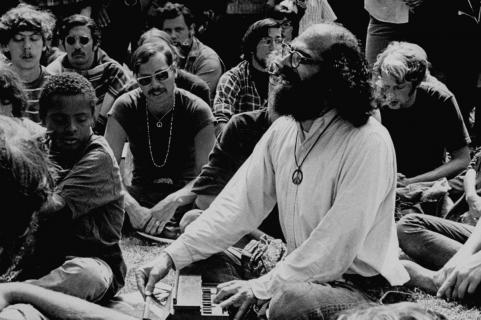
This year marks the 60th anniversary of Allen Ginsberg writing “Howl,” widely recognized as a pivotal moment in US literature and arguably the most important American poem since World War II. It is at once both sprawling and structured; a celebration and a lament; observed and prophetic. Its subsequent publication sparked an obscenity trial in which the judge ruled in favor of the value of Ginsberg’s art, now 60 years later translated into dozens of languages and read worldwide.
 Though even today, “Howl” is certainly not without its critics. It is a rabble-rouser. It subverts and challenges expectations of poetic form and content alike. And this doesn’t necessarily sit well with readers who might prefer to remain within their comfort zones. But in my continuing experience with class after class of students of all ages, this is the poem that garners the most attention, the keenest discussion, the purest engagement. The reason? Because this is where it all starts. Not only for for me personally, as a 17 year old with what I assumed to be passing literary interests, but for so many others.
Though even today, “Howl” is certainly not without its critics. It is a rabble-rouser. It subverts and challenges expectations of poetic form and content alike. And this doesn’t necessarily sit well with readers who might prefer to remain within their comfort zones. But in my continuing experience with class after class of students of all ages, this is the poem that garners the most attention, the keenest discussion, the purest engagement. The reason? Because this is where it all starts. Not only for for me personally, as a 17 year old with what I assumed to be passing literary interests, but for so many others.
In his long, breath-shaped lines, Ginsberg fused two American giants: the precision of William Carlos Williams and the sprawling exuberance of Walt Whitman into a poetic restatement for a new generation, a new era that shares so much with our present moment: anxiety, radical individuality, political division, the dominance of industry, but perhaps above all, the persistence of joy. Allen Ginsberg was the 21st century almost 50 years before it began.
He was also a longtime Colorado resident, co-founding the Jack Kerouac School of Disembodied Poetics at Naropa University with fellow poets Anne Waldman and Diane di Prima. He traveled all over the world but consistently returned to Colorado, hosting America’s most provocative and incisive talents at the Kerouac School, a list that includes William Burroughs, Amiri Baraka, and Sonia Sanchez.
Over the weekend of June 13th & 14th, we will read "Howl" together at Litfest. We’ll examine its context, its lineage— both laterally and longitudinally—and its influence as a cultural event. We will write into and around the poem, its rhythms, its music, its universe of reference. We will read the works that influenced Ginsberg, considering the America in which the poem was born, and the America that we occupy and embody today. Join us!
"who journeyed to Denver, who died in Denver, who came back to Denver & waited in vain, who watched over Denver & brooded & loned in Denver and finally went away to find out the Time, & now Denver is lonesome for her heroes"
From "Howl" by Allen Ginsberg
Read and discuss the entire poem during Lighthouse's upcoming Lit Fest. Reading as a Writer-Howl at 60 begins June 13. Register today.
Richard Froude has written three books: FABRIC (Horse Less Press, 2011), The Passenger (Skylight Press, 2012), and Tarnished Mirrors: Translations of Charles Baudelaire (Muffled Cry Editions, 2004). He can be found online at richardfroude.com

